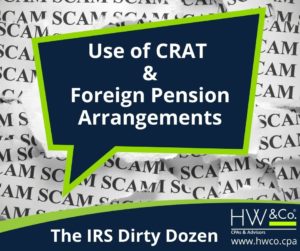 The IRS has released its Dirty Dozen list for 2022. Compiled annually, the Dirty Dozen is a list of the top tax scams and schemes that fraudsters use to steal from unsuspecting victims.
The IRS has released its Dirty Dozen list for 2022. Compiled annually, the Dirty Dozen is a list of the top tax scams and schemes that fraudsters use to steal from unsuspecting victims.
Over the next few weeks, HW&Co. will present the scams you need to know about to help prevent yourself from becoming a victim. Read about these scams and share them with friends and family.
Today, we’ll go over the first two scams on the IRS Dirty Dozen list.
1: Use of CRAT to Eliminate Taxable Gain
In this transaction, appreciated property is transferred to a Charitable Remainder Annuity Trust (CRAT). Taxpayers improperly claim the transfer of the appreciated assets to the CRAT in and of itself gives those assets a step-up in basis to fair market value as if they had been sold to the trust. The CRAT then sells the property but does not recognize gain due to the claimed step-up in basis.
The CRAT then uses the proceeds to purchase a single premium immediate annuity (SPIA). The beneficiary reports, as income, only a small portion of the annuity received from the SPIA. Through a misapplication of the law relating to CRATs, the beneficiary treats the remaining payment as an excluded portion representing a return of investment for which no tax is due. Taxpayers seek to achieve this inaccurate result by misapplying the rules under sections 72 and 664.
2: Maltese (or Other Foreign) Pension Arrangements Misusing Treaty
In these scams, U.S. citizens or U.S. residents attempt to avoid U.S. tax by making contributions to certain foreign individual retirement arrangements in Malta (or possibly other foreign countries). In these transactions, the individual typically lacks a local connection, and local law allows contributions in a form other than cash or does not limit the amount of contributions by reference to income earned from employment or self-employment activities.
By improperly asserting the foreign arrangement is a “pension fund” for U.S. tax treaty purposes, the U.S. taxpayer misconstrues the relevant treaty to improperly claim an exemption from U.S. income tax on earnings in, and distributions from, the foreign arrangement.
For more information, please visit the IRS website or contact an HW&Co. Advisor today.
Keep reading for more of the IRS Dirty Dozen list.



